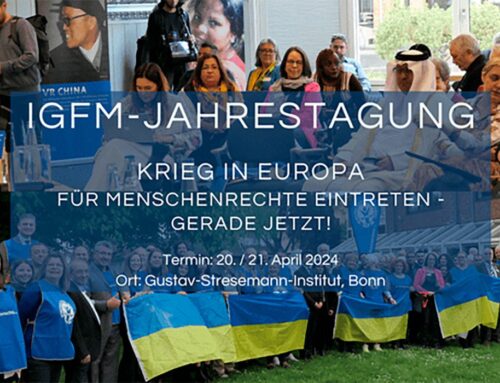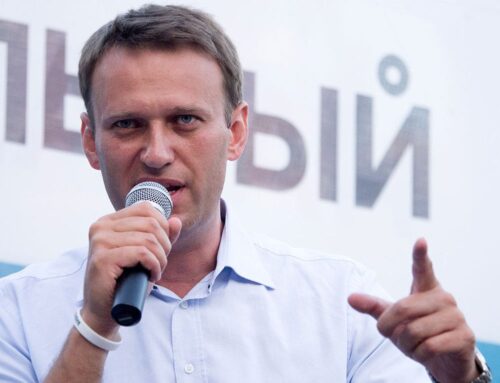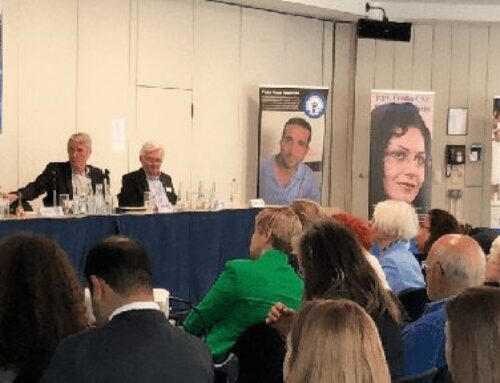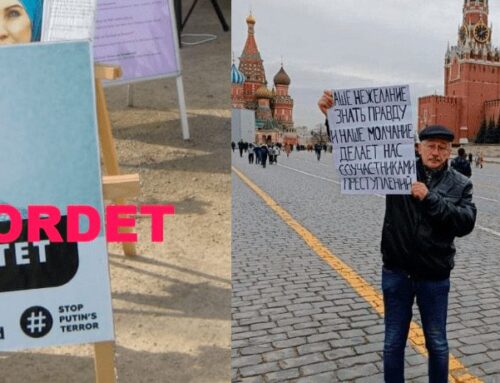Monitoring of the trial of А. Melnik, А. Kryzhanovskiy, I. Pasichnyi, I. Kunik (court sessions 05-06/02/2018)

February 5-6 in the Poltava District Court two preliminary court hearings were held on the case of the head of the TV company “Visit” Alexander Melnik, who is one of four accused (along with A.Kryzhanovsky, I.Pasichny, I.Kunik) of the murder of the mayor of Kremenchug A. Babayev and the judge of the Kremenchug court A.Lobodenko.
The case is seised by the fifth panel of judges after the new change of territorial jurisdiction (previously considered in Kobelyatsky, Kiev and Oktyabrsky district courts) due to the inability to form a panel of judges, which can be interpreted as the delaying of the trial. It is considered necessary to note that every time a change of collegium of judges accurse, the case begins to be considered anew. While for 3.5 years the four suspects are held in detention.
In the course of the court hearings, several petitions were filed, including: to giving Melnik a long-term meeting with his wife and sons; regarding the need for equipped premises for eating and confidential communication with lawyers, as well as permission to sit outside the metal “cage” next to advocates in time of court sessions. All of these petitions were rejected or redirected to other government bodies.
During the monitoring period, experts of the International Society for Human Rights have noted several human rights violations, which may be inconsistent with the European Convention for the Protection of Human Rights and Fundamental Freedoms:
- Suspects are held in an isolated “cage”, which, according to practice of the European Court of Human Rights (ECHR) may be degrading human dignity in violation of Article 3 (ECHR case “Svinarenko and Slyadnev v. Russia”). Also in this case the ECHR stressed, that “the applicants must have had objectively justified fears that their exposure in a cage during hearings in their case would convey to their judges, who were to take decisions on the issues concerning their criminal liability and liberty, a negative image of them as being dangerous to the point of requiring such an extreme physical restraint, thus undermining the presumption of innocence”. In addition, the appearance in the cage can be considered as a curtailment of their procedural rights, since all four defendants are deprived of the possibility to confidentiality communicate with their lawyers. At the last session, the court rejected the petition of the defense to allow defendants to seat next to their defenders during the court session. According to the judges such decision is beyond the competence of the court. At the same time, there was a decision of the Kiev district court dated February 21, 2017 that allows suspects to be seated next to lawyers during court hearings, and it is not fulfilled. Also, according to paragraphs 1, 23 of the Instructions on organization of convoying and the content in the courts of the accused (defendants) convicted on demand of courts, all matters related to maintenance and escort are assigned to the presiding judge and are mandatory for the chief of the guard.
- Failure to provide the necessary medical care to Melnik as a handicap who suffered a stroke and had different chronic diseases in connection with his participation in the elimination of the consequences of the accident at the Chernobyl (1 category) – the court rejected the application, explaining such decision by the lack of necessary authority. Although the ECHR in the cases of “Yakovenko v. Ukraine” and “Lunev v. Ukraine” prescribed, that the state is obliged to provide health and well-being of persons deprived of their liberty.
- One of the attorneys stressed that his rights as a lawyer were also violated, because he has no opportunity to communicate confidentially with his client. Because, there is no area in the court designated for such purposes, and during the process his client is held in a metal cage. The ECHR has repeatedly claimed the fact that the confidential liaison with a lawyer is protected by the Convention as an important guarantee of the right to protection (in such cases as “Sakhnovsky v. Russia”, “Castravet v. Moldova”). The ISHR experts confirm that conditions in a cage and the presence of a law enforcement officers in its immediate vicinity does not allow to conduct confidential communication.
- Violation of the principle of equality of arms. When considering a defense complaint on the actions of the investigator, the prosecutor read out the petition for the extension of the term of detention in relation to each of the suspects. And only after this suggested to the court not to consider the complaint of the defense, while the lawyers and defendants were limited by the court in providing personal comments and thoughts on their own complaint and were asked to “adhere to the essence of the case”. In this way, one can question the objectivity and impartiality of the court. In addition, the prosecutor stated that the interest of the broad public to the case and presence of the representative of the ISHR is one of the reasons for the extension of the measure of restraint. Another reason is that the suspects do not admit their guilt, have a joint opinion and support each other’s petitions.
- The prosecutor did not allow the defense to get acquainted with the petition for extension of the preventive measure contrary to Part 2 of Article 184 of the Code of Criminal Procedure and stated that lawyers and suspects should “comment by ear”. And that request to receive a copy of the petition and time for familiarization with the text is an attempt to delay the process. The court pointed out to the fact that the prosecutor read out in detail the text of the petition and therefore defense does not need a copy of it. When one of the lawyers asked the judge for a permission to ask the prosecutor a question regarding the petition of the defendant, the presiding judge rejected the request, noting that “the prosecutor cannot be questioned”, and suggested to limit to expressing personal opinion on the application.
In spite of the ambiguous attitude to the representatives of the ISHR from the prosecutor, it is considered necessary to note that in a two day period metal “cage” was replaced with a glass box. Also, according to the lawyer and one of the representatives of the convoy, the accused (for the first time ever) were fed during lunch time. Following the consideration of the prosecutor’s application, the court decided to extend the preventive measures in the form of detention until 11 April 2018. Experts of The International Society for Human Rights will continue monitoring this judicial process. The next hearing will be held on February, 14. Previous materials can be viewed here.
Expert Council of the ISHR








Leave A Comment